

Kenya launches world’s first mobile-only government bond. Kenya launches world’s first mobile-only government bond Kenya has launched the world’s first ever mobile only government bond, allowing the average Kenyans to purchase government bonds on their mobile phone as the East African country seeks to tap into the booming mobile money market.
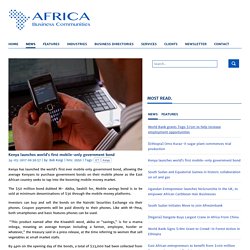
The $50 million bond dubbed M- Akiba, Swahili for, Mobile savings bond is to be sold at minimum denominations of $30 through the mobile money platforms. Investors can buy and sell the bonds on the Nairobi Securities Exchange via their phones. Coupon payments will be paid directly to their phones. Like with M-Pesa, both smartphones and basic features phones can be used. “This product named after the Kiswahili word, akiba or “savings,” is for a mama mboga, meaning an average Kenyan including a farmer, employee, hustler or whatever,” the treasury said in a press release, at the time referring to women that sell vegetables at small market stalls. www.treasury.go.ke. Africa: Study Provides Fresh Insights Into the Benefits of Mobile Money in Kenya. Photo: Boniface Mwangi An M-Pesa agent and mobile phone shop in Nairobi (file photo) analysisBy Sarah Logan, International Growth Centre A recently published study on the long-run effects of mobile money on economic outcomes in Kenya provides some valuable insights that will benefit economic development and financial inclusion policies across Africa.
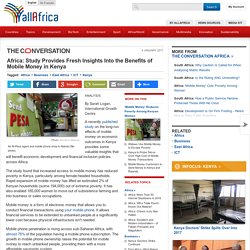
The study found that increased access to mobile money has reduced poverty in Kenya, particularly among female-headed households. Rapid expansion of mobile money has lifted an estimated 2% of Kenyan households (some 194,000) out of extreme poverty. Mobile money is a form of electronic money that allows you to conduct financial transactions using your mobile phone. Mobile phone penetration is rising across sub-Saharan Africa, with almost 76% of the population having a mobile phone subscription. Bitcoin Opens an Africa-China Remittance Corridor. BitPesa, through its website, is helping businesses in China and Africa to send instant payments in local currency directly from African bank accounts to Chinese bank accounts.

Users in Kenya, Uganda, Tanzania, Nigeria and the Democratic Republic of Congo can now send money directly to bank accounts in China. The remittance service offered by BitPesa is low-cost as it cuts conventional money transfer costs by up to 60%, according to the company. The trade between China and Africa increased to more than $170 billion in 2013 according to the World Bank and is estimated to have hit $220 billion in 2016, as Chinese companies invest heavily in small businesses across the continent. But until now, African companies had limited options for paying their Chinese suppliers in a swift and affordable way, according to BitPesa CEO Elizabeth Rossiello.
The cost of sending payments via traditional methods is high and can take days to settle. Kenya's financial inclusion improves to 75.3% in 2016. KCB: A Bank Interconnected With Kenya's Economic Development. How do you assess the banking and financial sectors in Kenya at the moment?
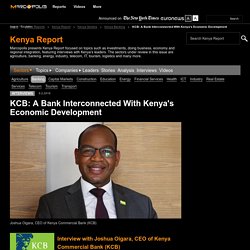
Obviously, we had a difficult year last year and during the last quarter, largely because we have had a number of difficulties with many institutions. Three banks were put under management of the Central Bank. However overall, we have 43 banks today; it is a very strong and dynamic sector. Data sharing enables Kenya bank loans. Kenya caps the cost of bank loans. Big Kenyan banks seen swallowing up small ones as depositors run for cover following failures. A SERIES of bank failures is set to trigger a wave of mergers and acquisitions among Kenyan lenders as depositors seek safety in the biggest financial institutions.
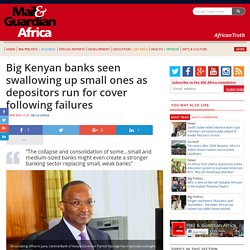
Consolidation is inevitable in the $61 billion economy, where 42 banks serve 44 million people, compared with 22 banks in Nigeria, which has a population of 180 million and gross domestic product that is nine times bigger, according to Cytonn Investments Management Ltd., a Nairobi-based money manager. The nation’s regulators were forced to step in with emergency support to stem depositor panic after the collapse last week of Chase Bank Kenya Ltd., the third lender to be placed under statutory management since August. “We are on the cusp of a market-led consolidation,” said Aly-Khan Satchu, chief executive officer of Rich Management, a Nairobi-based adviser to companies and wealthy individuals. “The issue for the central bank is to keep it orderly and avoid a disorderly Darwinian situation.” 7 banks hold 80 percent of Kenya’s population cash - Capital Business. By KENNEDY KANGETHE, NAIROBI, Kenya, Apr 6 – Only seven banks out of 42 banks hold 80 percent of Kenya’s population cash raising concerns of liquidity among Kenyan Banks.
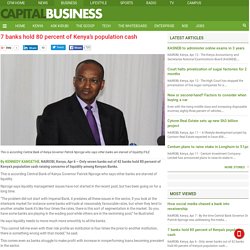
This is according Central Bank of Kenya Governor Patrick Njoroge who says other banks are starved of liquidity. Njoroge says liquidity management issues have not started in the recent past, but has been going on for a long time. “The problem did not start with Imperial Bank, it predates all these issues in the sector, if you look at the interbank market for instance some banks will trade at reasonably favourable rates, but when they lend to another smaller bank it’s like four times the rates, there is this sort of segmentation in the market.
Kenya plans interest corridor to lower costs of credit: IMF. NAIROBI (Reuters) - Kenya's central bank will align the interbank lending rates with its benchmark lending rate through a new interest rate corridor to lower the cost of credit in the real economy, the International Monetary Fund said.
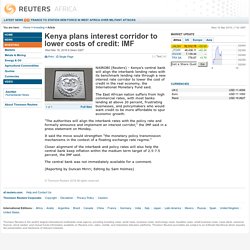
The East African nation suffers from high commercial rates, with most banks lending at above 20 percent, frustrating businesses, and policymakers who would want credit to be more affordable to spur economic growth. "The authorities will align the interbank rates with the policy rate and formally announce and implement an interest corridor," the IMF said in a press statement on Monday. Kenya's super-rich keep cash in equities, bonds. Nairobi Residents Turn to Community Currency.
Several low-income settlements outside Nairobi are using a new community-based currency called "pesas," which are equal in value to the Kenyan shilling and can be spent in the community just like cash.
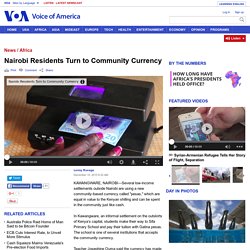
In Kawangware, an informal settlement on the outskirts of Kenya’s capital, students make their way to Sifa Primary School and pay their tuition with Gatina pesas. The school is one of several institutions that accepts the community currency. Teacher Josephine Ouma said the currency has made life easier. "This currency works in a way that it circulates, so as a teacher I get it from the parents and I still take the same currency back to the parents to buy their goods," she explained. "So it is a circulation process that I do not think there can be any scarcity. " Teacher Josephine Ouma says the currency has made life easier. Africa: Kenya Among Africa's Most Promising Mergers Markets. By Immaculate Karambu Kenya is among the most attractive target countries for merger and acquisition activity in Africa according to a new report by a business risk consultancy.

Control Risks also names South Africa and Nigeria as other top countries in the continent where investors want to put their money. The report was produced after a survey that involved interviews with 100 merger and acquisition practitioners operating in Africa. Respondents expect 41 per cent of foreign buyers of African companies in 2016 to come from Europe with Asia-Pacific and North America at 39 per cent and 16 per cent respectively. Energy, mining and utilities are expected to generate most merger and acquisition activity in the region accounting for 79 per cent followed by industrial and chemicals sector.
"Downturns in more established markets make international buyers look out for new targets. Kenya: Stanchart Kenya Offers Yuan Accounts On Bulging China Trade. By Otiato Guguyu Standard Chartered Bank is offering to open Chinese currency accounts for its clients on account of rising China-Africa trade.
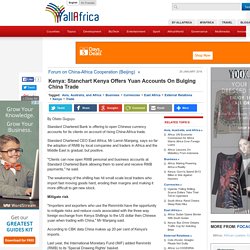
Standard Chartered CEO East Africa, Mr Lamin Manjang, says so far the adoption of RMB by local companies and traders in Africa and the Middle East is gradual, but positive. "Clients can now open RMB personal and business accounts at Standard Chartered Bank allowing them to send and receive RMB payments," he said. The weakening of the shilling has hit small scale local traders who import fast moving goods hard, eroding their margins and making it more difficult to get new stock. Mitigate risk. Kenya to set world record $27bn mobile money transfers in 2015. Kenya’s mobile money transactions hit $23 billion in the 10-months to October which is $4 billion more than in the same period last year, according to data from the country’s Central Bank.
Kenya: Bitcoin flourishes, despite central bank's disapproval. Kenya: Virtual Currency Bitcoin, Bitpesa Rejected in Kenya. By Davis Weddi Lately, the uptake of virtual currency has suffered a setback in East Africa with the Central Bank of Kenya (CBK) issuing an outright rejection and caution to citizens against using virtual currencies like Bitcoin. In a statement, CBK maintains Bitcoin and other virtual currencies are not legal tender because they are not issued or guaranteed by any government.
"No protection exists in the event that the platform that exchanges or holds the virtual currency fails or goes out of business," CBK said in a statement published on its website last week. 1.6 million taxpayers now on KRA iTax system - Business. About 200,000 TAXPAYERS sign up on KRA’s online tax filing system iTax in May 2015, bringing the total number of users to 1.6 million. In May 2015 alone, 200,000 taxpayers signed up with the iTax system, bringing the total to 1.6 million, a development aimed at boosting the taxman’s efforts in collecting tax and tracking down the non-complying cases.
According to KRA Commissioner-General John Njiraini, the taxman is using data from iTax to design and implement effective compliance strategies for tax payment. What is behind Kenya's financial revolution? Parent Category: Mobile Published on 24 November 2014 By Eugene Ngumi, Frank Nyambweke, consutants at africapractice Since its introduction in 2007, Safaricom's mobile money platform, M-Pesa, has not only transformed Kenya's financial system, but has become the dominant medium for financial transactions in Kenya. It is now used by at least 70% of households in the country, with some 43% of the country's GDP channelled through M-Pesa each year.
In 2014, more than $20 billion was transacted through the service. The service has grown from a money transfer platform to a bank account, and a payment platform that allows users to pay utility bills, school fees, rent, and for goods and services at shops, offices, restaurants and other businesses around the country. How this came about is a result of three unique factors; innovation, inaction on the part of regulators, and power of a monopolistic market actor.
Innovation Inaction. Safaricom launches VC fund for Kenyan startups. Safaricom has launched a $1 million Venture Capital fund targeting local mobile app startups in Kenya, likely giving it the first opportunity to adopt some innovative technology. The Safaricom Spark Venture Fund will offer venture capital ranging from $ 75,000 to $250,000 per startup. "We see this as a much-needed catalyst that will help actualize our aspiration to nurture a vibrant ICT economy in Kenya," said Joe Ogutu, director of strategy and innovation at Safaricom. "It will directly address the key startup and developers' pain points such as the cost and speed of accessing a platform where they can test their solutions. " Safaricom had previously been accused of "stealing" ideas from local startups that pitch business plans in the hope of accessing a mobile platform, 17 million subscribers and the financial marketing muscle that the company commands. Kenyan banks’ EA branches post record profits.
The regional subsidiaries of KCB, Equity and Co-operative had mixed fortunes, but the lenders posted double digit growth in net profit for the nine months to September. Kenyan banks’ EA branches post record profits. Kenya - Duncan Kabui,CEO of Chase Bank Kenya. The most from the coast. Kenya set to introduce 5% CGT. Kenyan Startup Aims to Speed Bitcoin to Africa. Bank Posts 58% Rise in Profits. Mobile cash growing fastest, says new report - Business_News. By NATION CORRESPONDENT A global research firm has identified debit card and mobile payment as the fastest growing industries in Kenya.
Market Publishers Ltd, which has offices in Britain, Russia and in the US, said Kenya’s mobile payments business has reached an equal level of trust with similar enterprises in South Korea and Japan. “In 2011, transactions worth Sh318 billion were settled by the use of mobile payment services and with plans to form a regional trading block comprising the East African community, Kenya could become the launch pad for a boom in electronic payments across East Africa,” says the report. In the meantime, the volume of Internet users surpassed a 7.48 million mark in 2012 compared to 3.3 million in 2011, setting the stage for a positive impact on Internet banking.
Eight Kenyans make it to the Forbes African list. Mark Kaigwa is among eight Kenyans who have made it into the Forbes Annual list of African entrepreneurs under the age of 30 for making the most impact in the continent. Kaigwa is a partner at Afrinnovator.com, a website focused on African innovations and technology.
Kenya: Investors Eyeing Local Insurance Firms - Study. INVESTOR interest in the insurance sector has increased as research projects premiums collected by firms will increase by an average of 18 per cent over the next five years with a slower rise in claims. According to analysis by the Standard Investment Bank, the growth in premiums will be driven by rising GDP per capita that will increase discretionary income of consumers and rise in private household credit that will lead to acquisition of assets, thereby boosting demand for insurance services.
Head of research at SIB Francis Mwangi said: "Penetration of insurance over the next five years will increase at a faster rate than it has been doing over the past few years because of better regulatory environment and market conditions. " Penetration, SIB said, will increase to 4.03 per cent by 2015 mainly driven by increased short-term insurance uptake. Currently the industry's penetration is at 3 per cent of the country's GDP. Kenya diaspora inflows hit $1bn in 2012 - Money Markets. Photos/FILE Dollar inflows from Kenyans working in the United States and Canada were the main contributors to foreign remittances, hitting the $1 billion mark in 2012. Business Portal » New Index To Track African Equity Portfolios » Markets » News. New exclusive banking service for Kenya’s rich. CfC Stanbic Bank, Kenya’s sixth largest lender, has launched a new service aimed at high net worth individuals with investible assets of over US$1 million.
The Private Clients offering provides rich customers with a full spectrum of services, including specialised lending and investment solutions. Grofin offers Sh3b to fund Kenyan entrepreneurs. Kenya’s Diaspora Remittances On The Rise. Private Equity Funds Earmark $10m For Kenyan Techpreneurs. Kenya: Bank of China Comes to Kenya.